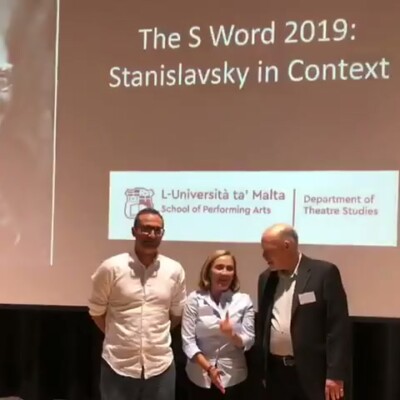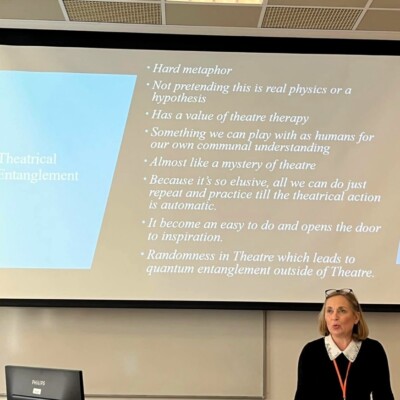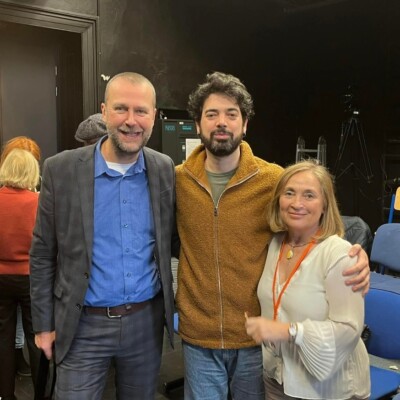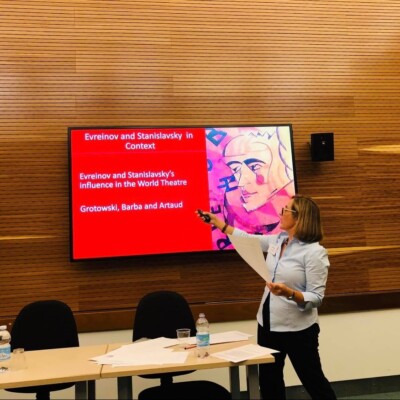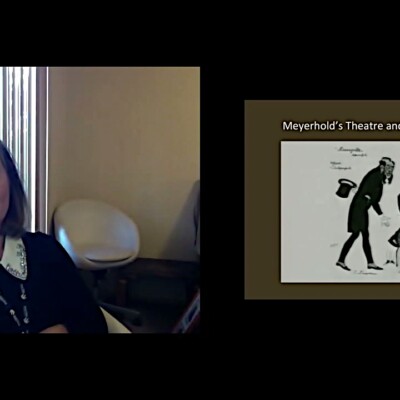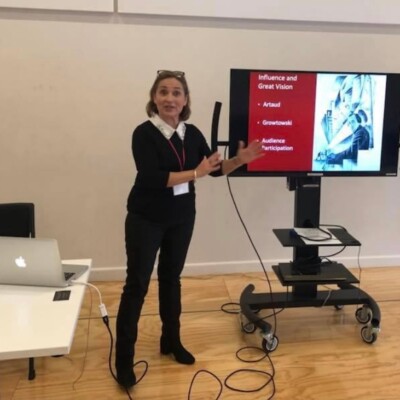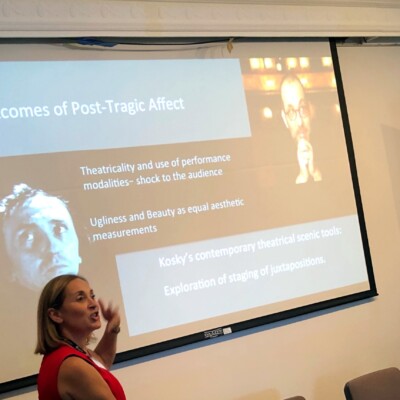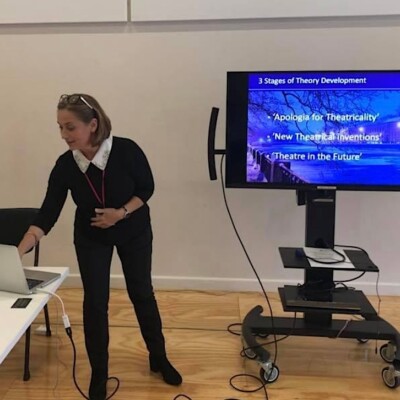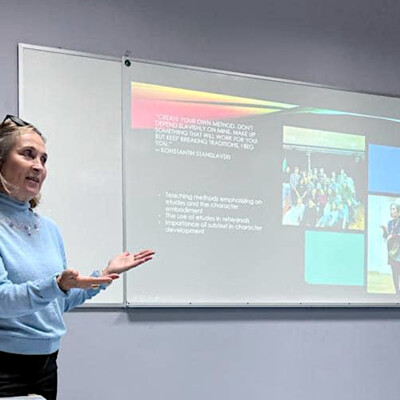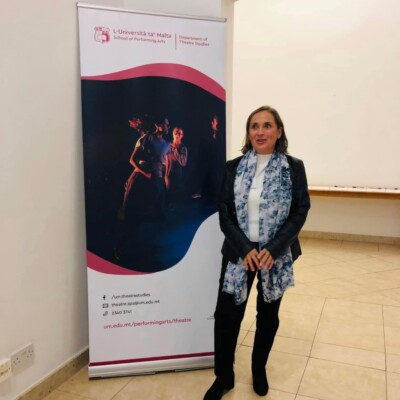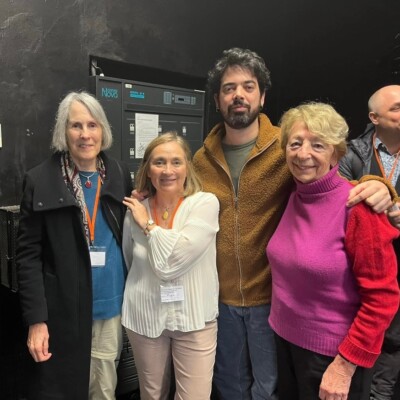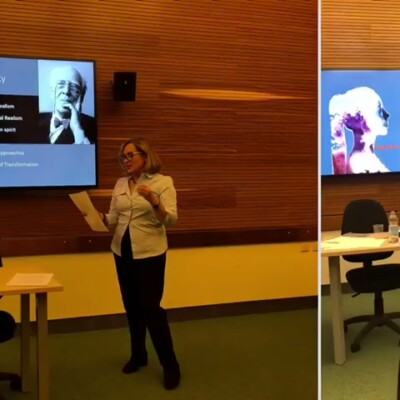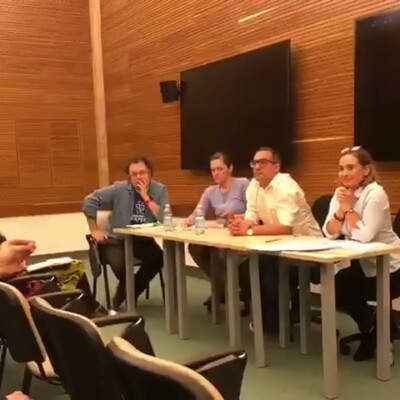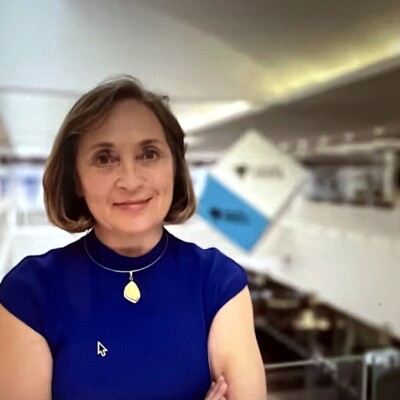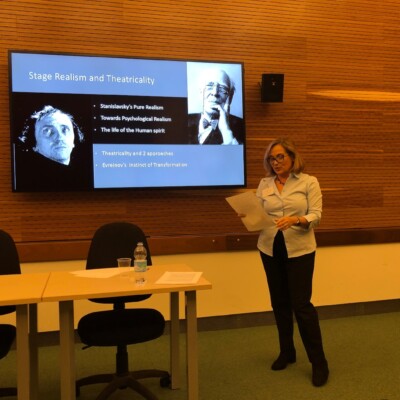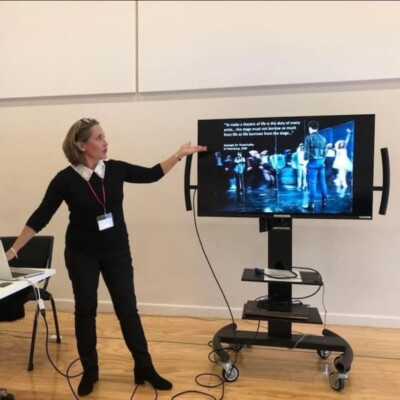In my role as an academic and a performer, my research on “Evreinov and exploration of Theatricality” have led me to suggest that individuals possess a natural inclination for transformation, or an Art instinct, as a means of transformation.
I actively participate in the Stanislavsky Research Centre and the Australasian Association of Drama, Theatre, and Performance Studies. I have presented my research at various international conferences, such as the University of Malta’s S-Word Symposiums in 2019, Stanislavsky Last Words in DAMU Prague in 2022, Stanislavsky: pedagogue in Athens, Greece 2023 and S-Word Stanislavsky and Place, Perth 2024. Additionally, I have contributed to discussions at web conferences and online presentations hosted by the Stanislavsky Research Centre. In 2020, my paper “Stanislavsky Versus Evreinov on Stage Realism and Theatricality” was published in “Stanislavsky Studies” by Routledge. Currently, I am working on a chapter for the series “Stanislavsky: Language and Emotion” and an essay titled “The Spirit of Theatre, Spirit of Performance is a Communal Spirit“.
In my research I discuss the use of Stanislavsky’s principles in acting education in Australia and around the world with a focus on building “the human spirit on stage“: how the principles of mindfulness enhance the actor’s connection with the stage, promoting unique personal expression in quantum physics-like performance.
Research Gallery:
Some of my research and publications:
A state of stillness and mindfulness in the actor’s preparation for the role
Presented at the S-Word Symposium: Stanislavsky and Mindfulness Symposium,
London South Bank University, March 2023
Presented at the S-Word Symposium: Stanislavsky and Mindfulness Symposium,
London South Bank University, March 2023
The research concentrates on one of the latest’s Stanislavski discoveries documented in Zapisnye knizhki (1930-1936) – the importance of self-awareness and a state of stillness or mindfulness in the actor’s preparation for the role.
Use of mindfulness and stillness in acting training, leads to inspiration (vdohvnovenye) and the authentic voice of the actor. To train the actors as authentic performers is to aspire them to have creative intuition, depth of knowledge and active imagination. Stanislavski was talking about state of awareness as pure awareness, dropping into the theatrical realm. Whether you call it actors’ meditation or training actors in mindfulness or preparing for the role with creative intuition. The special exercises Stanislavski recommends in preparation for the role is to follow the simple details from morning till night, attempting to mindfully remember every second, all the practices of simple tasks with familiar objects that happen in a regular day. This exercise must be precise and can of course be performed with the real objects that are used in the simple rituals (eg. a mug is used in the act of making a cup of tea), but the goal of the exercise is to ultimately perform it with imaginary objects, with the same level of performative precision. It’s a training of self-awareness; a wholehearted, meditative state, a professional tuning of an instrument, concentrating on the silence in the actor’s heart.
During my training at the St Petersburg Academy of Performing Arts, first year students’ exam would consist of playing silent etudes and animals/characters – where the words are not required, but the essence of the scene, and the energy between actors and subtext must be very clear.
The main outcome is that the “living spirit of the viewer” awakens under the influence of the organically created “life of the human spirit” on the stage, and the viewer ascends from the personal identity and joins a communal spirit and experience.
My approach to acting education has evolved from focusing heavily on ensemble work without hierarchies to tailoring the Stanislavsky technique to meet the individual needs of actors. This shift places importance on recognising the unique personalities and individuality of each actor, prioritising their development over group dynamics. Additionally, we have embraced the practice of breaking the fourth wall, establishing a direct connection with the audience on subconscious level as a primary objective.
I am also exploring Stanislavsky’s vision of a revolutionary mise-en-scène, where the stage setting undergoes dynamic transformations to surprise both actors and the audience. The concept of mise-en-scène plays a crucial role in conveying the overall atmosphere and feel of a performance. Stanislavsky’s innovative ideas on the relationship between actors, their surroundings, and the audience have left a lasting legacy that continues to shape the world of theatre and acting.
Stanislavski versus Evreinov: on stage realism and theatricality
Published online: 03 Apr 2020
[ Full Abstract ]
Published online: 03 Apr 2020
[ Full Abstract ]
The theatrical Avant-Garde at the beginning of the 20th century in Russian culture produced many practitioners and theories which changed the theatre industry and influenced the development of world theatre for generations. Among them, Stanislavski’s Method of Physical Actions and Active Analysis are widely used, while Evreinov’s unique Monodrama still remains relatively unknown. This paper examines the differences and similarities between Evreinov and Stanislavski and specifically their approach to Scenic (Stage) Realism, the understanding of Theatricality, and instigation of modern theatre and performance practices of the 21st century. Evreinov’s theatrical career was overshadowed by his countryman, Konstantin Stanislavski as a result of social changes in Russia at that time.
Evreinov and questions of theatricality
Masters Research – Master of Philosophy (MPhil) 2018
[ NOVA open access repository ]
Masters Research – Master of Philosophy (MPhil) 2018
[ NOVA open access repository ]
As a professional actor I have always been puzzled by the question of what drives our desire for acting. Russian theatre practitioner of the 20th Century Nikolai Evreinov preconceived or intuitively searched for an answer to that exact same question, and he believed he found it. He called it “Theatricality’ or the Instinct of Transformation”. Throughout this thesis I present the research work conducted to explore the answers regarding the question above stated and, more specifically, what Evreinov meant by Theatricality itself.


